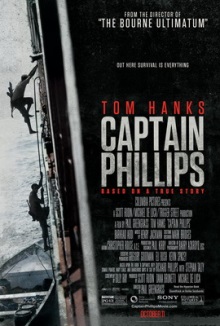
The first time I ever heard about this film was on CNN when I was in Greece. It received quite a bit of airtime and seemed to be considered as a fairly serious movie. I really liked the short clip that aired, showing Abduwali Muse entering the bridge of the Maersk Alamabama and menacing the captain. The scene was tense. The villain looked appropriately un-Hollywood. That was enough to pique my interest. I am therefore sad to report that after viewing it, it does turn out to be standard Hollywood action movie fare after all.
Admittedly, quite a few of the elements that annoyed me about the film aren’t its fault because it does a decent job of depicting how things really went down in real life. The crew of the US-flagged vessel, despite being unarmed, really did the outwit the Somali pirates. The pirates did fail to capture the ship and instead retreated in a lifeboat with Captain Phillips as their hostage. And the US Navy really did deploy a completely disproportionate level of military force to rescue one man.
All this may play out well to American audiences, but to me, the film reeks of American arrogance and self-centeredness. You do feel an initial bit of horror when the civilian crew realize that they’re being attacked by pirates armed with automatic weapons. After all, these are just regular guys doing a regular job. They have no combat training and they didn’t sign up to tussle with hardened killers. But once the confrontation begins in earnest, the Somalis are outwitted at every turn and their threats turn out to be so much empty bluster.
Not only does the crew draw first blood and severely injure one of the pirates, they even manage to beat up and capture their leader. Apart from kidnapping Captain Phillips, the pirates don’t in fact seem to do any sort of real harm to any of the crew members. I couldn’t understand why the pirates were so patient. If I were one of them, I think I would have snapped and started shooting the crew in the bridge until they were too cowed to pull off any more tricks.
The demeanour of our heroic captain doesn’t help to pull audience sympathies his way either. He is so confident and so unflappable that he looks like he is constantly in control of the situation, even when he is a prisoner. The pirates, by contrast, are panicky, bicker among themselves and are completely overawed by the massive amount of military hardware gunning for them. It’s hard not to feel sorry for these guys. If this were intentional on the part of director Paul Greengrass, this would be interesting bit of subversion, but I don’t think that’s the case here.
Then there’s the jarring military fetishism throughout the movie. The camera delights in showing every detail of the processes and procedures as the full might of the US armed forces is brought to bear against four Somali pirates armed with rifles. We get to be impressed by how US intelligence can discover not only the names of each of the pirates but their complete family tree. We get to see a SEAL team being delivered by air to the pursuing US naval vessels and watch them deploy huge sniper rifles with incredibly complicated sights. Everything is true to life too, so I can’t even say that it’s exaggerated but it makes for poor drama when the US side is so much more powerful than the pirates.
And of course, being based uniquely on the personal account of Phillips, the film leaves so much more of the story left untold. How about the story of the FV Win Far 161, the Taiwanese fishing vessel that the pirates were using as a mothership? Thirty crew members of that ship were held hostage for nearly a year before the ship was ransomed back to its owners. In that time, two of the captives died of malnutrition and neglect. Or how the Maersk Alabama was only one of four foreign vessels attacked or held by pirates based around the same mothership and the extensive US forces did nothing to help those vessels since none of the other captives were US citizens.
Finally there’s the fact that the depiction of events in the film is strongly disputed by many of the other crew members of the ship who argue that Phillips described his actions as being much more heroic that what he really did. Indeed, Tom Hanks’ version of Phillips is so much the archetypal Hollywood hero that the emotional breakdown he undergoes at the end of the movie completely unbelievable. The film was have gone over much better for me if the portrayal of Phillips was less flattering.
As it stands, Captain Phillips is entertaining enough as summer action movie fare since it is competently acted and shot. But judging it with a serious eye, it feels like a jingoistic celebration of American prowess. From his excellent work on United 93, which was both naturalistic and delightfully free of political posturing, I expected more of Paul Greengrass. I’m sorry to say that he completely dropped the ball here.